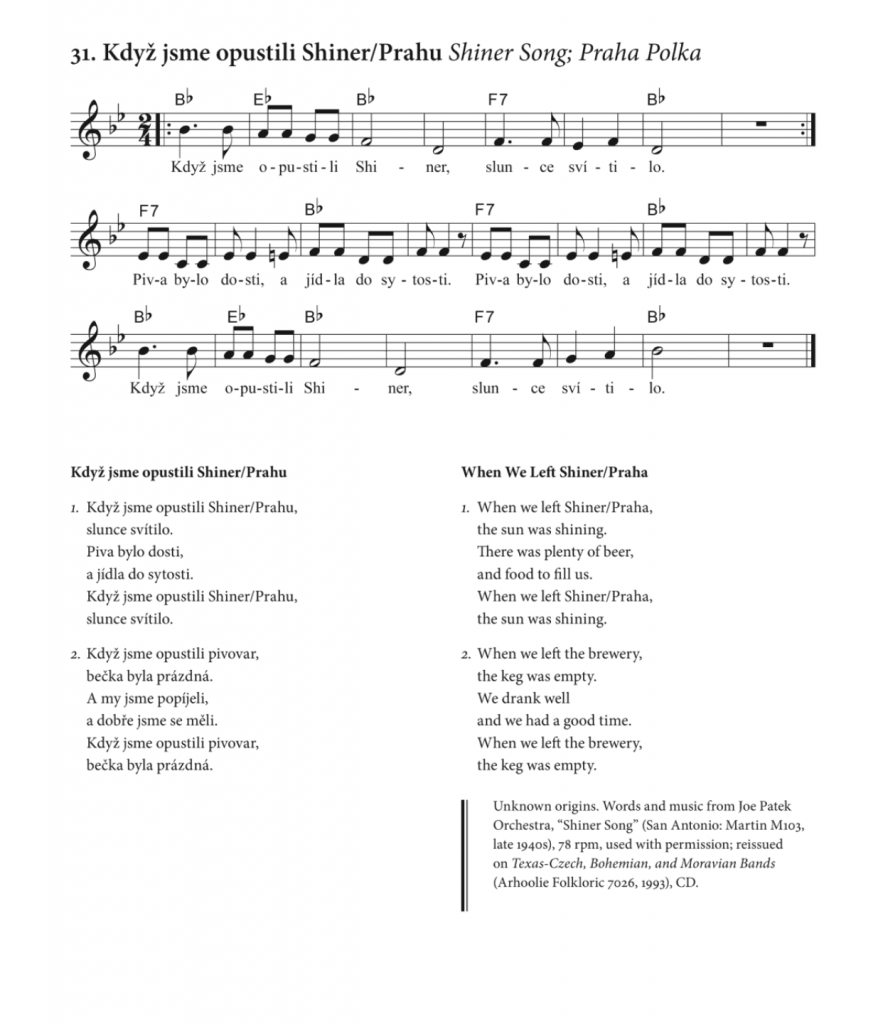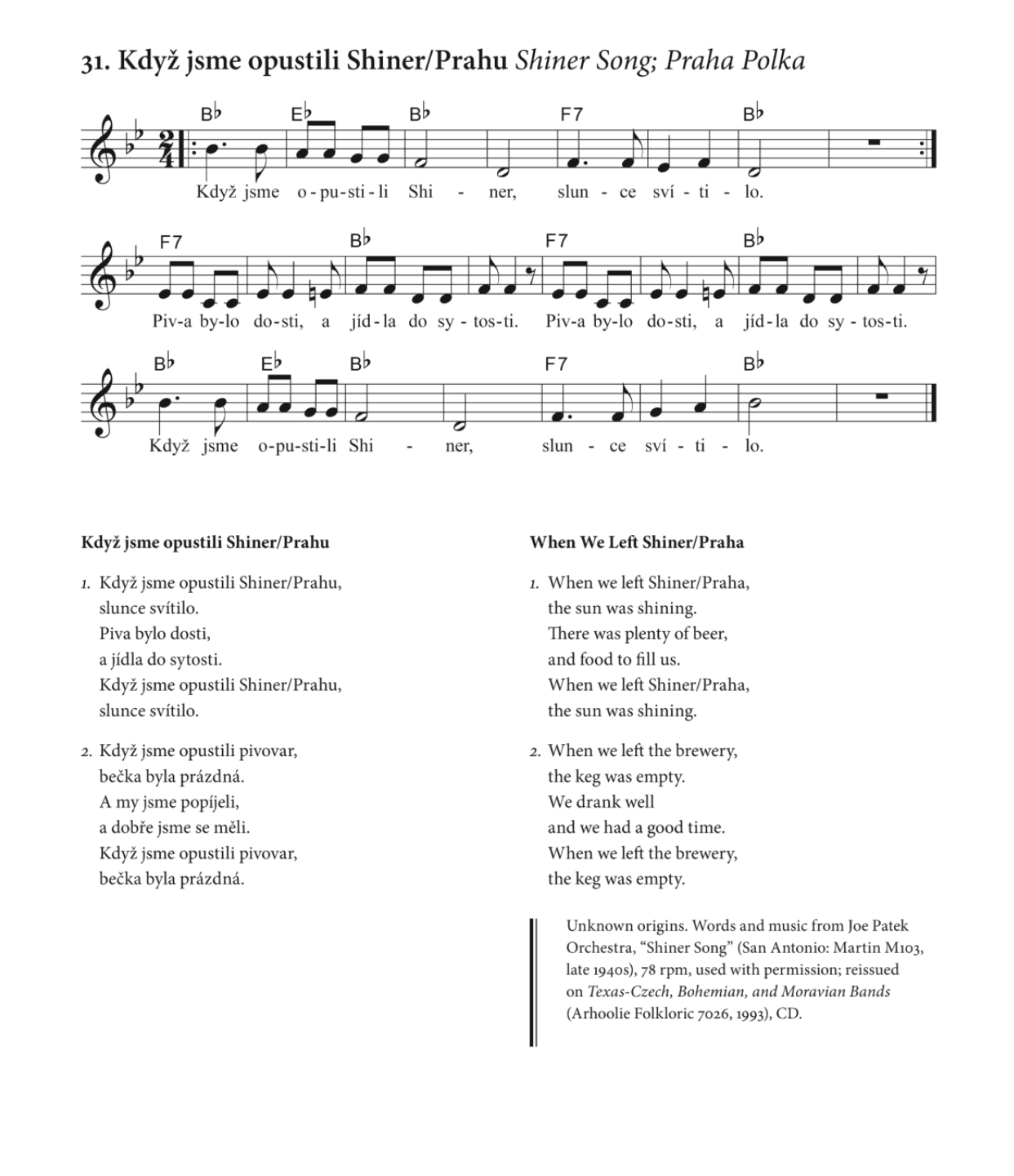Adolph Hofner played an integral part in the western swing of southern Texas during the 1940s and throughout his lifetime. Adolph Hofner and his band went through a number of name changes but when “Shiner Song” was recorded they were under the name “Adolph Hofner and His Bohemians”. Adolph Hofner is one of the best-known Czech musicians of Texas. He stated that “I was about the first guy to put a country music sound to German and Czech music and to this day it follows me”. Hofner was an important part of the mix of European music and Western Swing which was extremely popular with the neighborhoods he would play for in San Antonio and southern Texas. He is most well known today as the original performer of “Cotton Eyed Joe”.
Western Swing is a modernized sound of the fiddle band which was the main dance music in Texas during the 20th century. Western Swing is a mix of country, polka, blues, and swing music. Western Swing was popular in the early 1930s starting in North Texas and in Southern Texas (Houston and San Antonio) where Adolph Hofner and his band would play.
The band performed and recorded many Czech-American songs usually keeping the Czech lyrics. “Shiner Song” or “Farewell to Prague” has a reference to the Texan beer company Spoetzel’s Shiner beer located in Shiner Texas. With the popularity of radio advertising, the Pearl Brewing Company of San Antonio became sponsors of Adolph and his band which led the band to change the lyric in the song from “Shiner” to “Prague” in order to avoid conflict between the beer companies rivalry. The band changed their name to “Adolph Hofner and the Pearl Wranglers” during this recording in 1950. Although the song is titled “Shiner Song” Adolph still sings “Prahu” in the song where other bands will go on to sing “Shiner” in the image of the lyrics below you can see where the change would happen depending on what the band wants to sing.

Adolph Hofner was able to create a mix of genres and embrace different cultures in his music when he performed at the dance halls in Texas. In interviews with some of his family and community that would dance to his music said that he could sing anything from Italian music to American traditional country music. He was able to combine these genres to celebrate his ethnicity and the songs he would listen to growing up as well as create a way for others in his community to enjoy it without having to be from that ethnicity. He would perform all over southern Texas and all of his fans and crowds of people would say how kind and interactive he was with them and how he created a lasting impression on the people of his community in Texas. His influences of Czech and Bohemian culture included a lot of polka dances such as schottisches which were brought to Texas with the European immigrants in the late 1800s. The communities embraced their European culture and mirrored how they lived once they arrived in Texas which kept the culture and traditions strong within the community. Adolph was able to modernize these traditions and bring together the music he loved and take from American and European music to make unique and entertaining dance music that was popular throughout his entire life.
Sources:
Adolph’s Beautiful America. Vimeo, 22 Sept. 2021, vimeo.com/7501007.
Barton, Frances A., et al. Czech Songs in Texas. University of Oklahoma Press, 2021.
Foodie, Honky Tonk. “Adolf Hofner Was a Texan Famous for Western Swing.” Texas Hill Country, 16 Mar. 2020, texashillcountry.com/adolf-hofner-texan-western-swing/.
“Local Memory: A History of Music in Austin.” – Artist – Local Memory: A History of Music in Austin, local-memory.org/artists/adolph-hofner-and-all-the-boys.
SGT Fitch. YouTube, YouTube, 4 Apr. 2018, www.youtube.com/watch?v=ckEfk-LSnLY.
Texas Polka News Salutes Adolph Hofner. YouTube, YouTube, 18 Nov. 2016, www.youtube.com/watch?v=r1OB-UmAvMk.
“The Texas-Czech Bohemian & Moravian Bands.” Arhoolie Productions Inc., 1993. https://folkways-media.si.edu/liner_notes/arhoolie/ARH07026.pdf
“Western Swing in Austin, Part I: 1940-1950.” – Local Memory: A History of Music in Austin, local-memory.org/the-rise-of-the-honky-tonks/narratives/western-swing-part-i.


